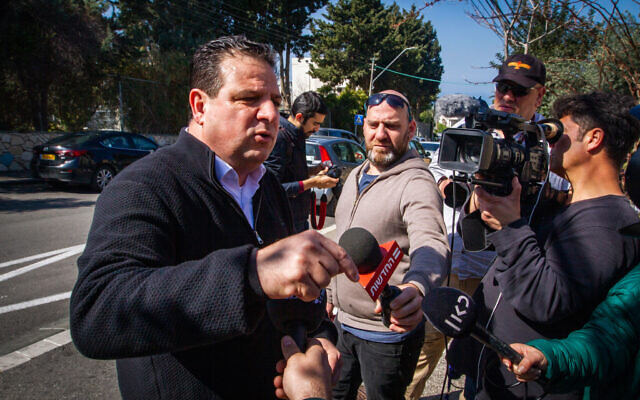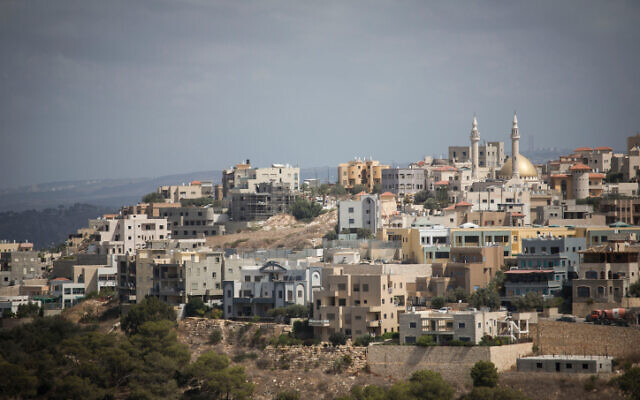At an online English-language town hall event on Tuesday, Yesh Atid party leader Yair Lapid was making his election pitch to over 600 English-speaking Israelis who had tuned in over Zoom.
After a short speech laying out his case against the outgoing government, Lapid took questions for over an hour. One participant asked a question not usually raised in such forums. Hailing from the upscale northern town of Zichron Yaakov, he asked Lapid to comment on the enormous wealth and infrastructure gap between his town and the adjacent Arab town of Fureidis.
Lapid’s response was a forceful one.
Coalitions, he began, require compromises, so each party must decide which of its policy objectives are “a must, things I will never compromise on.” For Yesh Atid, he said, those were “LGBT rights, the fact that we won’t let [the right wing] do whatever they want with the [Palestinian] territories — and the fact that Israel needs to invest more in its Arab population.”

Yesh Atid leader Yair Lapid speaks at an English-language online town hall meeting ahead of Israel’s March 2021 election, on February 9, 2021. (Facebook screen capture)
Israeli politicians, especially on the right, often respond to questions about equality with practical arguments. Investment in the Arab community is good for the economy, good for industry, reduces crime — its strongest argument, in other words, is that it’s good for everyone else. But Lapid’s concern was emphatically about the Arabs themselves.
It’s “right,” he said, “for the country to invest in Arab neighborhoods the same money they’re investing everywhere else, in housing, in schooling, in the health system. This should be — it’s just the right thing to do.”
He added: “I travel quite a bit. I’m always a bit ashamed when entering an Arab city or an Arab town in Israel and seeing how the roads shrink and how the infrastructure [worsens]. Civil equality is part of what countries should do. And we don’t.”
He noted that Israel spends about 25% less on Arab children in school than Jewish ones.
“This is just not right,” he said. “You don’t get to do this if you consider yourself a just country. We cannot sit in Zichron and look at Fureidis and say [to ourselves], these are second-class citizens. There are no second-class citizens in a country that respects itself.”
Lapid’s concern for the Arab community in Israel isn’t new in the broadest sense. He has written and spoken about inequality before. But there is a new urgency to the question for Israel’s politicians, and for good reason.
In flux
“Things are very much in flux,” explained Yousef Makladeh, the preeminent pollster of Israel’s Arab community. “Public opinion is shifting much more dramatically than in the past.”
The Joint List, an alliance of the four main Arab parties, has done spectacularly well in the last two elections, winning 13 and 15 seats in the last two races, the latter a historic high for Arab political representation in the Knesset.
But that’s not expected to happen again this time around, Makladeh told The Times of Israel on Thursday. The splintering of the list with Ra’am’s departure, as well as the collapse of an Arab political consensus that saw the parties put aside internal differences in favor of unity, appear set to drive down turnout in Arab towns.

Left to right: Members of the Joint List party MKs Osama Saadi, Ayman Odeh, Ahmad Tibi and Mansour Abbas arrive for a consultation with President Reuven Rivlin on whom he should task with trying to form a new government, in Jerusalem on September 22, 2019. (Menahem Kahana/AFP)
Makladeh noted that the Arab parties are now running negative campaigns — “campaigns of hatred” — against each other.
“Very strident campaigns and strident discourse. Those campaigns lower the turnout,” he said.
He predicted 100,000 fewer votes than the last election for the Joint List, a 17 percent drop from the roughly 580,000 votes the party won in March 2020.
But Makladeh also noted the folly of trying to read the future. Things are in flux like never before, he said, and “we can’t know what will be in a month.”
Makladeh’s polls, which have accurately predicted the Arab vote in the past, now put the Joint List at between six and nine seats, and rebellious Ra’am hovering near the electoral threshold, as likely to garner four seats as none.

An Arab Israeli girl casts her mother’s ballot at a polling station in the northern Israeli town of Umm al-Fahm on March 17, 2015. (AFP/Ahmad Gharabli)
If the most pessimistic of Makladeh’s models bear out, 15 outgoing seats in the 23rd Knesset may become just six returning to the 24th. Even his optimistic polls put the combined lists at a diminished 12 to 13.
That’s a resounding crash for the short-lived success story of the Arab list, reflecting the growing divides in the Arab community itself.
The lopping off of Ra’am has changed the conversation in the Arab political arena. In the past, the parties would jockey for higher placement on their amalgamated slate, which the average voter didn’t care about. “Now the fights are over agendas, issues,” Makladeh said.

Joint List party leader Ayman Odeh speaks to the media outside his home in Haifa, a day after the general elections, March 3, 2020. (Flash90)
Those issues are among the fundamental fissures of Arab politics: gay rights (Ra’am opposes, Hadash endorses); the approach to the Israeli-Palestinian conflict; the place of religion in public life; or Ra’am’s desire to join ruling coalitions, even if it means dealing with right-wing parties, in order to bring funding to Arab towns.
Up for grabs
That looming collapse has driven a massive effort among other parties to appeal to disenchanted Arab voters.
Parties from Likud to left-wing Meretz and Labor have made a public show of appealing to Arab voters, including by placing Arab candidates on their Knesset slates.
Prime Minister Netanyahu has spent a surprising amount of time over the past month campaigning among the Bedouin in the south, Ra’am’s most loyal base. He’s made a point of visiting coronavirus vaccination drives in Arab towns, sometimes in towns he had never before stepped foot in.
In a first, Likud on Thursday even released an Arabic-language campaign video.

Illustratie: Police at a temporary checkpoint to enforce coronavirus restrictions in the northern Arab town of Deir Al-Asad, April 15, 2020. (Basel Awidat/Flash90)
The Jewish-majority parties have good reason to appeal to Arab voters. Meretz and Labor now routinely poll precariously close to the threshold, so the prospect of new potential constituencies is an attractive one.
For Likud, the need to break the deadlock in a Knesset in which the right finds itself repeatedly on the cusp of victory but never quite there, drives its own calculated appeal to conservative Arab constituencies.
And for Yesh Atid, a self-avowedly liberal-centrist party, equality for Arabs is also a way of highlighting the defining ethos that is its political identity as it appeals to liberal, secular-leaning constituencies in the country’s urban centers.
That is not to say the parties ignored Arab citizens in the past. Meretz and Labor have long championed minority rights, and left-led governments in the 90s invested significantly in Arab towns, at least in comparison to past neglect.

Prime Minister Benjamin Netanyahu speaks to an unidentified woman during his visit to a coronavirus vaccination facility in the northern Israeli Arab city of Nazareth, on January 13, 2021. (Gil Eliyahu/Pool/AFP)
Netanyahu’s last three governments invested more in infrastructure, education, and other arenas of public life in the Arab community than any governments that came before. Likud used to play down that fact; now it celebrates it.
Yesh Atid, too, isn’t new to the issue. It has long supported investment in Arab towns. It also has a long record of attentiveness to Arab concerns. One recent example: After a police shootout with criminals in the Arab town of Tamra earlier this month left 20-year-old nursing student Ahmad Hijazi dead in the crossfire, Yesh Atid MK Yoav Segalovitz, a former deputy commissioner of the Israel Police, drove to Tamra to pay a condolence call to the victim’s mother.
عربيه????נסענו היום לטמרה לניחום אבלים בביתה של אום ג’בר חיג’אזי ששכלה את בנה אחמד חיג’אזי בעקבות פעילות משטרתית כנגד…
Posted by יואב סגלוביץ – Yoav Segalovitz on Tuesday, February 9, 2021
Unlike other leaders now seeking the Arab vote, he already knew the way.
As Arab Israeli commentator and activist Afif Abu Much noted following the visit, “I’ve followed Segalovitz for a while, and I have to say that he makes a point of visiting Arab towns to hear the people, unlike many Jewish MKs who think of the Arab public and Arab society as a kind of territory outside the country.”
In other words, it’s too simple to dismiss the newfound commitment of Jewish politicians to the Arab community as mere politicking. Politicians from left-wing Meretz to right-wing Yamina like to think of themselves as inclusive and egalitarian, even if campaign strategy sometimes pushed them to behave otherwise. The new attentiveness is also driven by the most authentic of political impulses: There are votes up for grabs, and everyone wants them.
But will it last? If the next Knesset sees far fewer Arab lawmakers, who will hold the government accountable to its promises to the Arab electorate after election day? If the Jewish-majority parties discover that their campaigns failed to draw Arab voters, will the newfound concern for Arab communities suddenly evaporate from Jewish politics as quickly as it arrived, leaving Israel’s Arab citizens with nothing to show for all the lavish attention now on display?
 RSS Feed
RSS Feed















 February 12th, 2021
February 12th, 2021  Awake Goy
Awake Goy 
 Posted in
Posted in  Tags:
Tags: 













